

Skeptics On The .Net. Home. Ask for Evidence. We hear daily claims about what is good for our health, bad for the environment, how to improve education, cut crime, treat disease or improve agriculture.
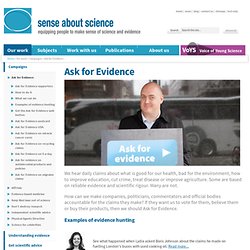
Some are based on reliable evidence and scientific rigour. Many are not. How can we make companies, politicians, commentators and official bodies accountable for the claims they make? Ask for Evidence. Every scientific method has its limitations, and it is usually difficult to draw conclusions from a single study (see how scientists summarise the results of multiple studies in part 6).
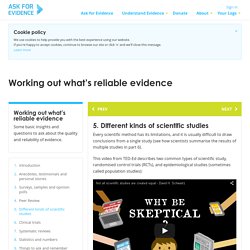
This video from TED-Ed describes two common types of scientific study, randomised control trials (RCTs), and epidemiological studies (sometimes called population studies): Below is a short list of the kinds of study to look out for, and their basic limitations. 54 ways people can be wrong, beautifully illustrated. Hypnotized by Charisma. Have you ever found yourself saying, “What were they thinking?”
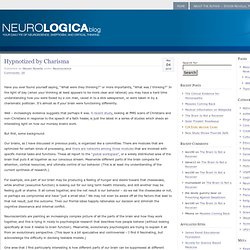
Or more importantly, “What was I thinking?” In the light of day (when your thinking at least appears to be more clear and rational) you may have a hard time understanding how you were fooled by a con man, caved in to a slick salesperson, or were taken in by a charismatic politician. It’s almost as if your brain were functioning differently. Well – increasingly evidence suggests that perhaps it was. A recent study, looking at fMRI scans of Christians and non-Christians in response to the speech of a faith healer, is just the latest in a series of studies which sheds an interesting light on how our monkey brains work. But first, some background. Our brains, as I have discussed in previous posts, is organized like a committee. One area that I find particularly interesting is how different parts of our brain can be suppressed at different times. But there is more going on here than just limited brain resources. The Skeptics Guide to the Universe. The Skeptic's Dictionary.
Promoting Reason & Rationality in the Public Arena. A fundamental problem. If you’ve heard of Accelerated Christian Education, it’s probably for the claim in one of their science books that the existence of the Loch Ness Monster disproves evolution.
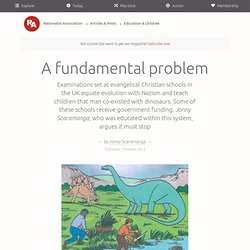
This arresting piece of information has gone viral on the web twice, guaranteeing that the organisation, which was founded in Tennessee in 1970, can never again be discussed without reference to it. I attended an ACE school from 1996 to 1999. Overcoming their indoctrination was a long and painful process; as recently as 2007 I wrote that evolution was “only a theory”. Later, it was my complaint to the Times Education Supplement that kickstarted the news of ACE’s Gospel of Nessie.
In reality, Nessie is the least of ACE’s problems. At least five ACE schools have received British taxpayers’ money since 2010, through the government’s nursery voucher programme. Carmel was the subject of the 2008 Dispatches documentary In God’s Name, which followed the activities of Christian fundamentalists in the UK. Rhetological Fallacies.
Welcome - The Richard Dawkins Foundation for Reason and Science. A guide to detecting bogus scientific journals. Case study: Entropy 2013, 15(4), 1416-1463 Glyphosate’s Suppression of Cytochrome P450 Enzymes and Amino Acid Biosynthesis by the Gut Microbiome: Pathways to Modern Diseases Following on a previous post discussing how bogus magazines pretending to be scientific journals can affect the judgement of non-specialists, a brief 5 steps method to pin-point dubious publications is described.
This method is not infallible and you must remain cautious, as pseudoscience may still dodge the test. The Skeptic's Dictionary. The Rationalist Association. Thats Nonsense! - Keep You Safe Online by Debunking Internet Scams and Hoaxes. Quackwatch. Rbutr - Browsing rbutr content. Snopes.com: Urban Legends Reference Pages. 8 tips for fact-checking from PolitiFact.
Credit: Thinkstock Fact-checking is an integral part of being a journalist, and there are now many organisations that exist solely to verify facts in areas which time-stretched reporters may find difficult to fully investigate.
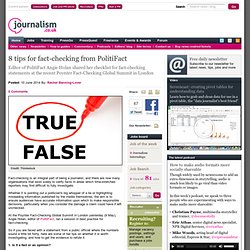
Whether it is pointing out a politician's big whopper of a lie or highlighting misleading information published by the media themselves, the aim is to ensure audiences have accurate information upon which to make responsible decisions, particularly when you consider the damage a claim could have if left unchecked. At the Poynter Fact-Checking Global Summit in London yesterday (9 May), Angie Holan, editor of PolitiFact, ran a session in best practise for fact-checking. So if you are faced with a statement from a public official where the numbers sound a little bit fishy, here are some of her tips on whether it is worth investigating, and how to get the evidence to refute it. 1. Sometime it is a tough call between fact and opinion. 2. 3. 4. 5. 6. 7. 8.
Cognitive Biases. Debunkatron. Bad Science. Project Reason: A Non-Profit Dedicated to Reason. The Science of Why We Don’t Believe Science — Editor's Picks.